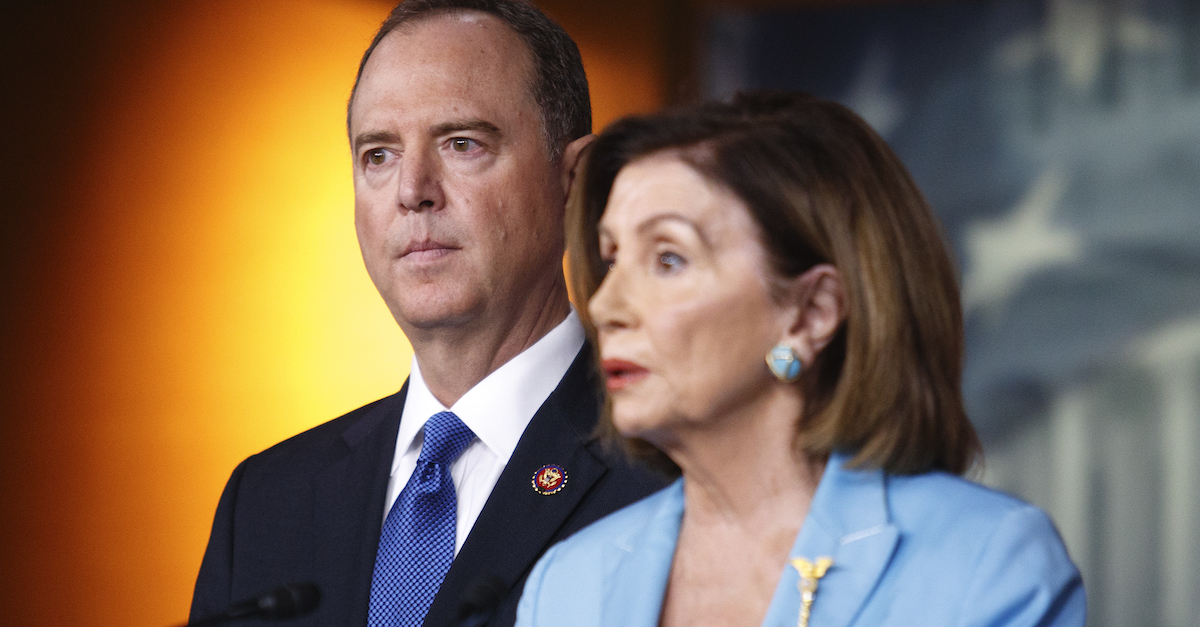
House Intelligence Committee Chairman Rep. Adam Schiff (D-Calif.) on Thursday revealed some ground rules in order to narrow the scope of impeachment inquiry questioning and to clarify the kinds of questions proposed GOP witnesses must be able to answer if they are to be considered relevant to the proceedings.
Politico’s Kyle Cheney obtained a copy of the questions and provided necessary context about them.
“SCHIFF details questions that witnesses must speak to in order to be considered relevant to impeachment hearings. This is meant to guide which GOP witnesses they’re willing to call,” Cheney said. “SCHIFF’s questions are crucial because it shows how narrowly Democrats intend to keep the lens of their public impeachment hearings — it’s an early attempt to prevent a free-for-all and keep the focus on Trump’s actions.”
Note that the impeachment rules resolution that was voted on allows House Republicans to suggest potential witnesses, interrogatories or subpoena requests–but those will have to be done in advance; in writing; and they are subject to approval by House Democrats:
To allow for full evaluation of minority witness requests, the ranking minority member may submit to the chair, in writing, any requests for witness testimony relevant to the investigation described in the first section of this resolution within 72 hours after notice is given for the first hearing designated pursuant [to the resolution]. Any such request shall be accompanied by a detailed written justification of the relevance of the testimony of each requested witness to the investigation described in the first section of this resolution.
Per the resolution, Schiff will make the initial call on whether or not a GOP witness, subpoena or interrogatory will be allowed during the Intelligence Committee phase. Similarly, Rep. Jerrold Nadler (D-N.Y.) will make such decisions during the Judiciary Committee phase. If either Schiff or Nadler decline a GOP attempt, then Nunes–or Rep. Doug Collins (R-Ga.) on the Judiciary Committee–will be able to bring their vetoed witness, interrogatory or subpoena suggestion up to the full committee for a vote. But seeing as each committee is run by Democrats, it seems unlikely that any Schiff or Nadler vetoes will be overturned by members of their own party down the road.
These are the questions witnesses are going to have to speak to if they are to be considered relevant to the impeachment proceedings against President Donald Trump:
Did the President request that foreign leader and government initiate investigations to benefit the President’s personal political interests in the United States, including an investigation released to the President’s political rival and potential opponent in the 2020 U.S. presidential election?
Did the President — directly or through agents — seek to use the power of the Office of the President and other instruments of the federal government in other ways to apply pressure on the head of state and government of Ukraine to advance the President’s personal political interests, including by leveraging an Oval Office meeting desired by the President of Ukraine or by withholding U.S. military assistance to Ukraine?
Did the President and his Administration seek to obstruct, suppress or cover up information to conceal from the Congress and the American people evidence about the President’s actions and conduct?
CNN legal analyst, attorney and impeachment expert Ross Garber noted that these questions, when phrased like statements, read like draft articles of impeachment.
Those draft articles seem to potentially include soliciting interference in the 2020 election, abuses of power, obstruction and/or a cover-up.
Colin Kalmbacher contributed to this report.
[Image via Tom Brenner/Getty Images]
Have a tip we should know? [email protected]